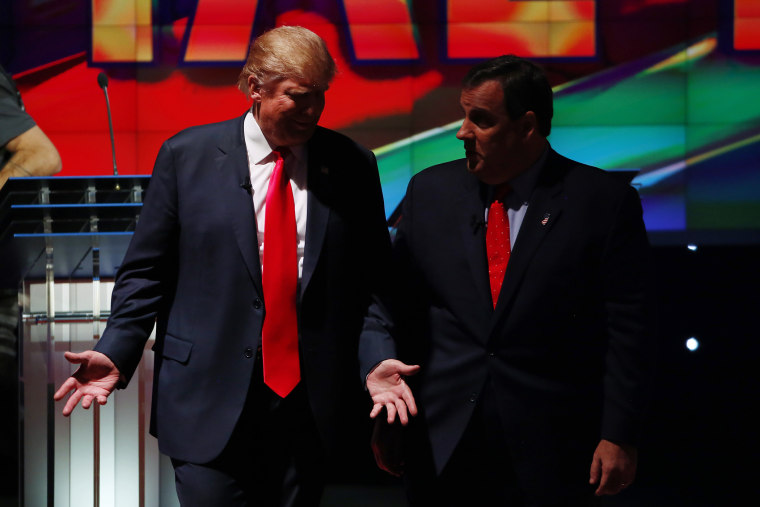The Republican presidential field had one last shot to make an impression before the holidays in Tuesday’s debate. For the most part, everyone made the most of it and pundits were hard pressed to name an outright winner. Assuming no big movement from anyone, the candidates appear to have settled into a clear set of front-runners, dark horses, and long shots.
The first votes at the Feb. 1 Iowa caucuses are only weeks away, making this last home stretch absolutely critical. Here are the four big story lines to watch that will likely determine the eventual nominee.
Do Donald Trump supporters show up?
This is the single biggest x-factor in the race. Donald Trump has amassed his biggest ever lead in national polls, a strong lead in New Hampshire, and is still competitive in Iowa. Along the way, he’s weathered continuous attacks from rivals and firestorms in the press, none of which has dented his support. His followers know what they’re getting at this point and don’t appear to be going anywhere.
RELATED: That Cruz-Rubio fight, explained
Pollsters and strategists are still puzzling out how substantial Trump’s support is, however. That’s because a lot of his strongest demographics may be less engaged with politics and, based on prior elections, unlikely to turn out and vote.
But that’s also what critics thought about Barack Obama’s 2008 primary strategy, which relied on major support from typically unreliable young voters. When the voting started, it turned out that the campaign had indeed found a way to keep these first-time voters motivated and headed to the polls. Trump may have found his own previously untapped base of blue-collar white voters, and we’ll learn pretty early how much his polling translates to actual support.
Ted Cruz and the Iowa path
Sen. Ted Cruz is looking as strong as ever this month and currently has arguably the clearest path to the nomination of any candidate.
His path starts with winning the Iowa caucuses and, right now, things couldn’t be going better. Cruz has won support from many influential figures in the state, including ultra-conservative Congressman Steve King and evangelical leader Bob Vander Plaats, and he is investing in an extensive ground game. Polls show him surging into the lead as Dr. Ben Carson, his previous top rival for social conservative support, fades into the background.
RELATED: Is Ted Cruz the Richard Nixon to Donald Trump’s George Wallace?
For Cruz, the plan is to use Iowa as the springboard to a victory in South Carolina and then the March 1 “SEC Primary,” which features a number of southern states that should be friendly terrain. The hope is that will put him in too strong a position for the more establishment candidates to consolidate support and prevent him from securing the nomination.
Right now, Trump is leading polls in a lot of those places, though, so Cruz’ll eventually have to steal votes from him to make it work. That will surely put a strain on their ongoing buddy-buddy relationship.
The New Hampshire dark horse race
At the same time Cruz is working Iowa and Trump is working the airwaves, a group of candidates are clustered in New Hampshire trying to win the nomination with a different approach.
Trump is very strong in New Hampshire, but the state is also fertile ground for more establishment-friendly candidates who are now competing for the right to challenge Trump and Cruz from the center in a three-man race. This group includes Jeb Bush, Chris Christie, John Kasich, and to some degree Carly Fiorina, as well.
None of them look strong nationally, but if anyone can break out of the pack and win the state (or place second to Trump), they could unify the GOP’s more moderate wing and rally Republican leaders nervous that Cruz or Trump would tank the party in a general election. This whole group is relatively close in New Hampshire polls for now so there’s room for all of them to daydream about breaking away in the final weeks.
The Rubio track
Then there’s Sen. Marco Rubio, who is running his own hybrid approach. Currently, polls show him second in New Hampshire, far behind Trump, and competitive in Iowa, although behind Cruz and Trump.
Compared to Cruz in Iowa and the various New Hampshire players, Rubio is less focused on winning one of the first two contests outright. Instead, his plan seems more geared towards maintaining enough strength to survive while the rest of the establishment-friendly candidates crowded in New Hampshire flame out.. At that point, he can consolidate their votes.
“I always strive for first place,” Rubio said on "Meet The Press" last week when asked about his strategy. “That doesn't always work out that way. And in many of these elections, a strong second place is viewed as a first place.”
There’s a lot of uncertainty to this approach, though. If he can’t score any early wins, Rubio might get pushed to the sidelines of the conversation, leaving Trump and Cruz to duke it out, or another contender like Christie or Bush to emerge as the leading alternative.
